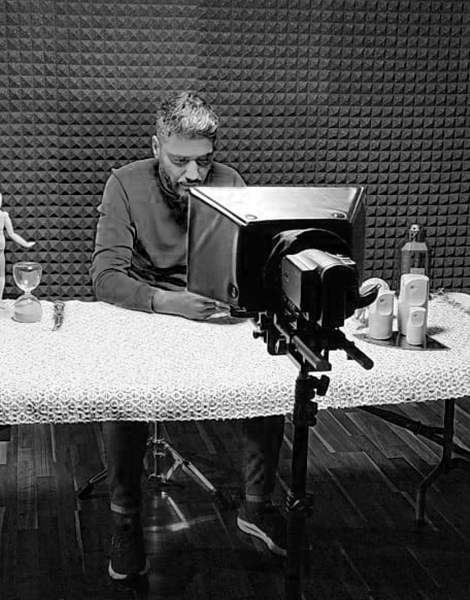Ahmad Al-Husseini was twenty-four when the wave of Arab Spring protests arrived in his native Iraq; he immediately joined the demonstrators in asking the government for political reform, accountability for human rights violations and higher involvement of youth in civic life.
This was the beginning of a decade-long journey in activism, with Ahmad contributing to organising demonstrations in 2013, together with a Kurdish friend who was eventually tragically killed in clashes with the security forces.
As Ahmad built a career as a journalist, screenwriter and producer, he continued to organise civil society demonstrations throughout Iraq in 2015 and 2018.
October 2019 saw the beginning of what came to be called the Tishreen (October) protest movement. The most significant anti-government protests in recent years, this cross-sectarian and nationwide movement demanded reform and modernisation of Iraq’s political system and demanded a better tomorrow for youth and for Iraq.
Hundreds of thousands of Iraqi took to the streets during the Tishreen protest, and succeeded in forcing the resignation of then Prime Minister Adil Abdul-Mahdi. But the state security forces, and other armed groups affiliated with the government responded with fire on multiple occasions, killing at least 487 and injuring over 7,700 from October 2019 to April 2020.
Three years later, the spirit of the Tishreen movement is still alive in Iraqi civil society, with many young activists becoming involved in political parties and gaining parliament seats with the 2021 national elections. However, there has been little to no accountability for the perpetrators of the violence committed, with many legal complaints filled by the families of the victims ignored.
It was this context which prompted Ahmad to become involved, together with his wife and fellow activist Shams Bashir, in ‘End Impunity in Iraq’, an NGO created by Iraqis abroad. At the time he was living in Turkey, where he had been forced to flee. “My name appeared on a wanted list in a Telegram channel managed by the militias. I knew they would come after me,” he says.
“Over the years, we had both gained a decent following on social media,” explains Shams, who became an online activist advocating for justice and accountability in Iraq after seeing videos of unarmed protesters being killed in 2019. “We decided to capitalise on it to do something more. That’s how Extra-Curriculum was born.”
Extra-Curriculum: explaining impunity in Iraq
Extra-Curriculum, produced thanks to EED support, is a YouTube show that is sparking public conversations about justice and impunity in Iraq. The target audience is 25-35 years old, a generation that has grown up in an atmosphere of propaganda and disinformation.
“The show starts by trying to answer very basic but important questions,” says Ahmad, “Like ‘What is justice?’, ‘How can our political system produce justice?’. From there, we discuss the present situation in Iraq.”
The issue of accountability is a key one in the country. Protestors are often intimidated, attacked and in some cases even killed by the armed forces or by militia groups who are almost never prosecuted for these crimes. While suspects can be arrested, the cases rarely go to trial. This creates a climate of repression and intimidation in which people are afraid to denounce crimes, and which further curtails freedom of expression.
“The problem of impunity goes back to the US invasion,” explains Ahmad. The US–Iraq Status of Forces Agreement, signed in 2008, laid out a plan for the withdrawal of US forces from Iraq while granting US soldiers immunity from prosecution. “This lack of accountability on the US side emboldened the Iraqi government to do the same and commit illegal acts with impunity. Today in Iraq the perpetrators of disappearances, forcible displacements, and assassinations are not being punished.”
“Very often the government offers a monetary settlement to victims, pressuring them to withdraw their case in court,” he continues, “But we want justice in Iraq to be about accountability, not monetary compensation.”
Impunity is not the only topic of discussion in the Extra-Curriculum show. Ahmad and Shams take on a wide range of themes, from journalism and women’s participation in public life to sectarianism in Iraq. Their approach is to take a historical perspective, starting with the past to discuss the present.
“Ahmad and I always say that Iraqis only live in the present, and forget anything that happened before,” says Shams, “This is because they are bombarded with government propaganda, which doesn’t want them to see the bigger picture.”
“We don’t want people to forget,” adds Ahmad, “Forgetting means not getting justice. There is no future without memory for Iraq.”
Advocating for accountability and human rights
Ahmad and Shams believe that a different approach is needed to ensure accountability. Ultimately, Iraq needs to ratify the Rome Statute and become a member of the International Court of Justice. “If this happens, the militias will need to be accountable to the global community, not just to Iraqis.”
After Extra-Curriculum, the couple is planning to conduct research on two books, one on assassinations in Iraq after 2003 and the other about new parties after the 2021 elections. They are also using their networks of activists, researchers and journalists to build a human rights archive in Iraq, documenting violations, assassinations and forcible displacements.
“There is a human right crisis in Iraq, and it’s very hard to access data to prove these violations, as the government doesn’t share it. That’s why we want to gather all the evidence we have,” explains Ahmad. “Not just the data. People are not just numbers, and we want to tell their individual stories.”
“We also want to create a platform for women in Iraq, to tell the world that we are not just suffering victims,” says Shams. “We Iraqis are accomplished people who are fighting for equality and accountability in an unjust society.”
This article reflects the views of the grantee featured and does not necessarily represent the official opinion of the European Endowment for Democracy, the European Commission or any other European State or other contributors to EED.
